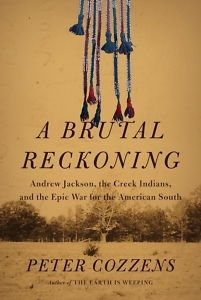Peter Cozzens opens A Brutal Reckoning: Andrew Jackson, the Creek Indians, and the Epic War for the American South with a remarkable observation. “No other Indian conflict in our nation’s history,” he writes, “so changed the complexion of American society as did the Creek War, which lies at the heart of this book.” He backs up his thesis with a detailed history of the Creek people, their interactions with other tribes in the Southeast, their relationship with the white settlers who came first to trade and then to conquer, and how Andrew Jackson turned battlefield victories into one of the largest land grabs in our history.

A Brutal Reckoning is Cozzens’ third in a trilogy of histories about the Indian wars, the first two being The Earth Is Weeping: The Epic Story of the Indian Wars for the American West and Tecumseh and the Prophet: The Shawnee Brothers Who Defied a Nation. The wars he chronicles are often overlooked or oversimplified in popular history and he offers needed reexaminations of the causes, complexities, and colorful personalities involved. The Creek War, for example, is often overshadowed by the contemporaneous War of 1812, which is described as America’s second war of independence. But it was much more than that – it was also a fight for land, both along the Canadian frontier and in the South, where America still bordered Spanish territories. And in that fight for land, the Creek, Cherokee, Choctaw, and Chickasaw nations lost, whether they were allied with the United States or not.
The first third of A Brutal Reckoning is an absorbing history of the Creek (Muscogee) people, including their first, disastrous encounter with Europeans in the person of Hernando de Soto. The Creek Confederacy, as it was known, was a large, sophisticated nation that alternately traded and warred with its neighbors. When they began trading with white settlers in Georgia and Tennessee, many of the Creek people prospered, but divisions between “traditionalists” and “progressives” soon emerged. By 1812, a state of civil war existed between most Creek communities and a group of fundamentalists known as the Red Sticks.
 The Red Stick faction began with visits from the Shawnees Tecumseh and his brother Tenskwatawa, who preached Indian revival via spiritualism and fidelity to the old ways. In a startling parallel to the late 19th-century Ghost Dance movement on the northern plains, some Creek people embraced the prophesies that foretold of white people disappearing and game returning to depleted lands. But the promises of bulletproof clothing and inviolable holy grounds proved tragically wrong.
The Red Stick faction began with visits from the Shawnees Tecumseh and his brother Tenskwatawa, who preached Indian revival via spiritualism and fidelity to the old ways. In a startling parallel to the late 19th-century Ghost Dance movement on the northern plains, some Creek people embraced the prophesies that foretold of white people disappearing and game returning to depleted lands. But the promises of bulletproof clothing and inviolable holy grounds proved tragically wrong.
In 1812, a Red Stick raiding party murdered and captured white settlers near the mouth of the Duck River, about 70 miles west of Nashville. It was the spark that ignited war. Andrew Jackson and others demanded military action and, despite Creek efforts to bring the guilty to justice, soon had the fight they wanted. Lasting two years, the conflict claimed hundreds and displaced tens of thousands. It was, as Cozzens’ title indicates, a brutal struggle. Atrocities were many and were committed by both sides. Jackson and other leaders exploited animosities between and within Indian tribes. After a victory at the Battle of Horseshoe Bend, Jackson imposed a treaty that deprived even his Native allies of their homelands.
Cozzens also believes that victory in the Creek War severely damaged the United States. It paved the way for President Andrew Jackson’s Indian removal policy and the horrific Trail of Tears, making vast inland areas available to white settlers and the people they enslaved to work the land. “That in turn,” states Cozzens, “gave rise to the Cotton Kingdom, without which there would have been no casus belli for the American Civil War.” Over 150 years later, we are still feeling the consequences of those calamities.

A Michigan native, Chris Scott is an unrepentant Yankee who arrived in Nashville more than 30 years ago and has gradually adapted to Southern ways. He is a geologist by profession and an historian by avocation.



